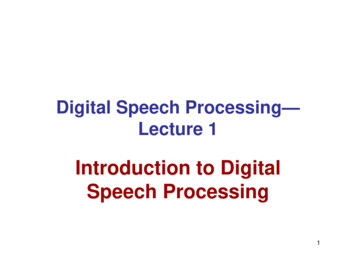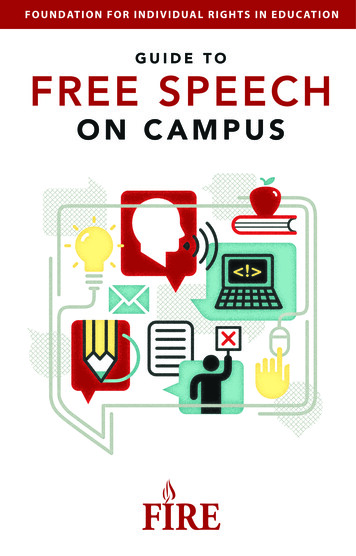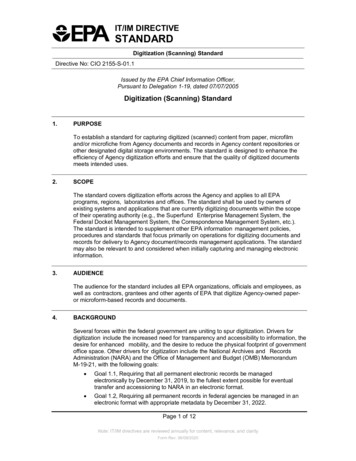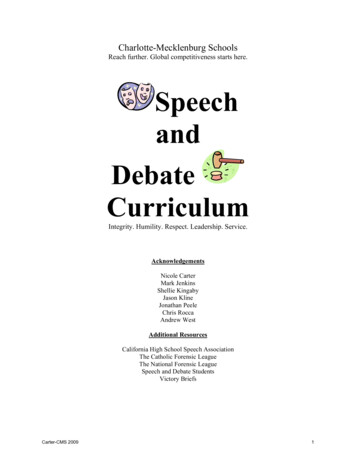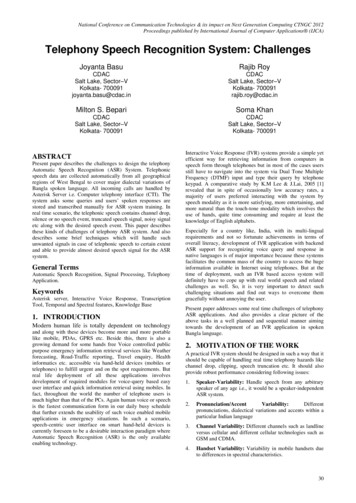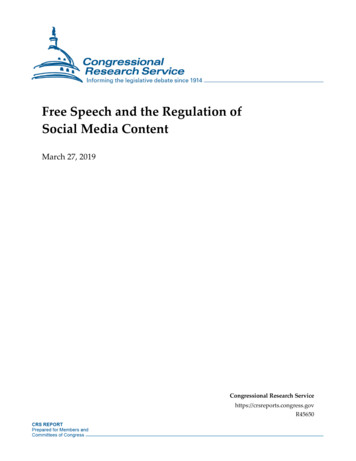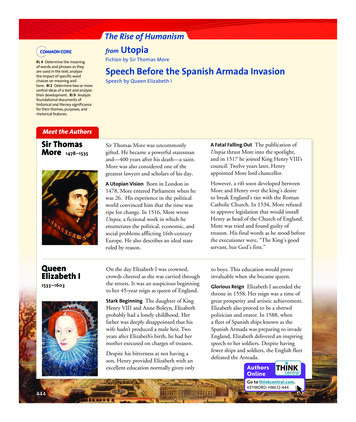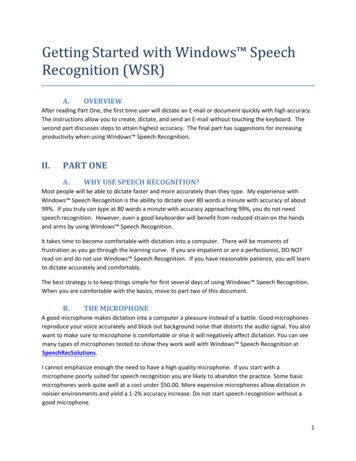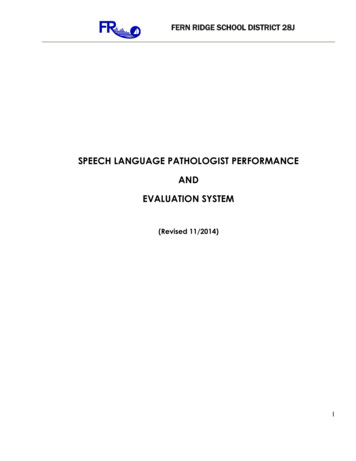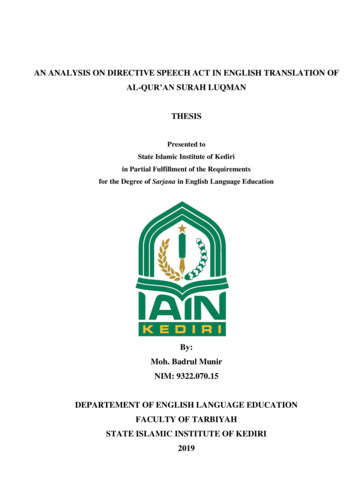
Transcription
AN ANALYSIS ON DIRECTIVE SPEECH ACT IN ENGLISH TRANSLATION OFAL-QUR’AN SURAH LUQMANTHESISPresented toState Islamic Institute of Kediriin Partial Fulfillment of the Requirementsfor the Degree of Sarjana in English Language EducationBy:Moh. Badrul MunirNIM: 9322.070.15DEPARTEMENT OF ENGLISH LANGUAGE EDUCATIONFACULTY OF TARBIYAHSTATE ISLAMIC INSTITUTE OF KEDIRI2019
ii
iii
iv
v
vi
MOTTORun to be GoodTrain to be BetterPractice to be The Best(NUHA Quotes) any who is (so) grateful does so to the profit of His own soul: but if any isungrateful, Verily Allah is free of all wants, worthy of all praise. (31:12)(Surah Luqman Ayah 12)vii
DEDICATIONThis Thesis is dedicated to:My Beloved Parents and FamilyMy hororable father Moh. Tarsis, my beloved mother Sholihah, my older brotherM. Yunus Jamhuri,S.Hum. and my little sister Nailul Lutfi Lailiya, you are myspirit, thank you very much for your endless support, love, suggestions, andprayers.My Teachers and My New FamilyK. H. Anwar Iskandar, Agus Fuad Fajrussobah, Agus Faris Idrisa, and all of myteachers in Islamic Boarding School of Al-Amin Kota Kediri. K. ZainulFajri,M.Ag , K. Al-Amin Misbah, M.M and all of my teachers in IslamicBoarding School of Mamba’us Sholihin Sumber-Sanan Kulon-Kab. Blitar. KH.Sirodjan Muniro,AR. and all of my teachers in Islamic Boarding School of NurulHaromain Tuksono-Sentolo-Kulon Progo-Yogyakarta. Than Dr. KH. MasroniNasir, M.Pd.I in Islamic Boarding School of Avissina Ngronggo-Kota Kediri andall of my new families in Kediri, thank you very much for the love, knowledge,affection, and other kind of good things you all give. Jazakumullah Khairan.My Great Members of English Department 2015All of members of C class OF English Department 2015 in IAIN Kediri (Luki,Aji, Toni, Nanda, Atiq, Ila, Atin, Ani, Galuh, Irma, Sofi,Uswa, and others)All of students of Al-AminThanks to my beloved friends, all the members of students of Al-Amin, especiallyfor the member of R 8 room: Kang Rival, Barok, Zuhri, Irul, Doni, Adib, Tasik,Rizki, Dalul, Faisal, and others. And All members of Kamar M6, M2, than R1 :viii
Rizal, Syaifudin, Dani, Hakiki, Galang, Habibi, Farid, Fajar, Syauqi etc. Thanksfor the good moments in these four years.ACKNOWLEDGEMENTSAlhamdulillahirobbil ‘alamin. First and foremost, I would like to thankAllah SWT, God Almighty for endlessly blessing me not only the good but ratherthan all the best things in my colourful life. Whose love and guidance haveenabled me to finish this thesis.In finishing this thesis entitled AN ANALYSIS ON DIRECTIVESPEECH ACT IN ENGLISH TRANSLATION OF AL-QUR’AN SURAHLUQMAN, the researcher has gotten a lot of helps and advice that involve manypeople. Therefore, the researcher would like to give appreciation to:1. Dr. Nur Chamid, MM as the Principal of State Islamic Institute of Kediri2. Dr. H. Ali Anwar, M. Ag as Dean of Faculty of Education and TeacherTraining State Islamic Institute of Kediri3. Dr. Ary Setya Budhi Ningrum, M.Pd as the chief of English Department2018/20194. Dr. Toyyibah, SS. M.Pd as the first advisor in finishing the thesis whoalways gives the researcher some advice to make this thesis correct andbetter.5. H. Burhanudin Syaifullah, M.Ed as the second advisor who givessuggestion too to the researcher in writing this thesis.6. Chothibul Umam, M.Pd as the main examiner who always gives theresearcher some advice to make this thesis correct and better.7. All of staffs in master office, academic office, SLC, and Library of IAINKediri who let support the researcher in the process of finishing this thesis.8. My honorable all of the lecturers in English Department of IAIN Kediriwho patiently give me many knowledges for several years. JazakummullahKhairan.ix
9. My beloved father Moh. Tarsis, my respectable mother Sholihah, All mybrothers of Ponpes Al-Amin and Avissina , and also all of my familythank you for your help.x
xi
ABSTRACTMunir, Moh. Badrul. 2019. An Analysis on Directive Speech Act in EnglishTranslation of Al-Qur’an Surah Luqman. English Department, Faculty ofTarbiyah, State Islamic Institute of Kediri ( IAIN Kediri ). Advisors : (I)Dr. Toyyibah, SS., M.Pd. (II) H. Burhanudin Syaifulloh, M.Ed.Key words : Directive Speech Act, Al-Qur’an Surah Luqman.This study focuses on analysing directive speech acts are used in Englishtranslation of Al-Qur’an Surah Luqman. Directive is utterance of addresser tomake addressee doing or not doing something. Al-Qur’an contains the mostbeautiful and greatest literary elements, otherwise also in Surah Luqman. Thissurah tells about Luqman’s advices and wise teaching to his son, the statement ofthe greatness and importance of the Holy Qur’an concerning the guidance ofhumankind, the division of human beings into the benevolent and the tyrant, andthe statement of their fate, than the reasons for the Faith in Origin andResurrection, the statement of Allah’s particular knowledge, such as: the time ofevery one’s death and the time of the occurrence of Resurrection.This study is intended to find out kinds of directive speech act in theEnglish translation of Al-Qur’an Surah Luqman, and the directive speech acts aremostly appeared in this object of study.The design of this study is descriptive qualitative. The data source of thestudy is English translation of Al-Qur’an Surah Luqman. The writer analyzed kindof directive speech act based on Jucker’s theory. Tafsir Jalalain is used to knowthe interpretation of the analyzed verses.It has been found that, there are six kinds of directive speech act in Englishtranslation of Al-Qur’an Surah Luqman , they are: commanding, ordering,suggesting, prohibiting, question, and apprise. All of these consist of 42utterances, they are: 11 utterances of commanding, 3 utterances of ordering, 3utterances of suggesting, 7 utterances of prohibiting, 4 utterances of question, and14 utterances of apprise.It can be concluded that the dominant directives used in EnglishTranslation of Al-Quran Surah Luqman is apprise that have role to give such kindinformation to the listener. Then all utterances are uttered by Allah SWT toMuhammad SAW, and the dominant people who was be addressee is Luqman AlHakim.xii
TABLE OF CONTENTSTITLE PAGE . iDECLARATION OF AUTENTICITY . iiAPPROVAL PAGE . iiiRATIFICATION SHEET . ivNOTA KONSULTAN . vNOTA PEMBIMBING . viMOTTO . viiDEDICATION . viiiACKNOWLEDGEMENT . ixABSTRACT . xiTABLE OF CONTENTS . xiiLIST OF TABLE. xivLIST OF APPENDICES. xivCHAPTER I: INTRODUCTION .1A. Background of the Study .1B. The Statement of the Problem .4C. Objectives of the Study .4D. Signifcance of the Study .5E. Scope and Limitation of the Study .6F. Definition of Key Terms .7CHAPTER II: LITERATURE REVIEW.9A. Speech Act .9B. The categories of speech act .13C. Directive speech act .16D. Al-Qur’an .24E. Surah Luqman .25F. Previous studies .27CHAPTER III: RESEARCH METHOD .30A. Design of this study .30B. Data source .30C. Technique of Collecting Data .31xiii
D. Technique of Analyzing Data .32CHAPTER IV: FINDINGS AND DISCUSSION .35A. Research Findings .35B. Discussion .74CHAPTER V: CONCLUSION AND SUGGESTIONS .78A. Conclusion .78B. Suggestion .79BIBLIOGRAPHY .81APPENDICESCURRICULUM VITAExiv
LIST OF TABLESTABLEPAGETable 1.1 The Dissemination of Directive Speech Act in Surah Luqman . 36Table 2 The finding and analysis of the research in appendix 1LIST OF APPENDICESAppendix 1 Finding and DiscussionAppendix 2 Daftar konsultasi penyelesaian skripsi 1Appendix 3 Daftar konsultasi penyelesaian skripsi 2Appendix 4 Curriculum Vitaexv
CHAPTER IINTRODUCTIONThis chapter consists of background of the study, statement of theproblems, objectives of the study, significance of the study, scope and limitationof the study, and the definition of key terms.A. The Background of the StudyThe Qur'an was revealed in Arabic-speaking state, as well as amedium of interaction between the Creator with His creature. Muslims believethat “through the angel Gabriel (Jibril) the Al-Qur'an was orally revealed byGod Allah SWT to Muhammad” (Lambert, 2013: 287). For about 23 years,beginning on December 22, in year 609 M, when Muhammad was 40 yearsold, and came back to Allah SWT in year 632 M, Al-Qur’an goes downgradually over those period . “the Al-Qur’an as the biggest miracle (mu’jizat)from prophet Muhammad to proof his most important prophetic,those areMuslims respect” (Peter, 2003: 12-13), and the top of a series of Godlymessages beginning with a message told up to Adam and ending withMuhammad. As usual human we can not understand the messsage stated inthe holy Qur’an directly. We need some experts explanation like mufassiriinin giving more definitions in Qur’an means and translate it in the nearestmeaningfull content.Through 23 years Al-Qur’an revealed to prophet Muhammad thatthose contains of stories, ordering, prohibiting and such kinds of Islamic rulesthat always available in each time and whole of our lifes. Most over of Al-
Qur’an contain of stories till those name of surah implies the content like insurah baqoroh tell female cow, an-naml tell about ant, than luqman tell thewise of Luqman and anothers. The Al-Qur'an as the source of data from thisstudy because the Al-Qur'an contains the most beautiful and greatest literaryelements. Inaddition, “the Al-Qur'an is the greatest wonder among thewonders of the world” (Jauharin, 2014: 4). Therefore, the author wants tostudy the communications that have been documented in the Al-Qur'anespecially in the Suroh Luqman which has been translated into the Englishlanguage, because in the Suroh Luqman there are many very importantcommunications occurred among the important people at historical momentsin order to get the good education and moral value especially value ofworship. The types of directive speech act in Surah Luqman are interested thewriter to find out those because many utterances of this Surah seem to consistof directive speech act.Moreover, researcher chooses directive speech act from part ofillocutionary speech act to conduct this study, because he wants to know whatLuqman’s son doing or not doing from his father utterances (Luqman thewise). Another reason is seeking for God direct message for his people in thisverses. The listener do or not do something by the speaker utterance is themeans of directive speech act, same as stated by Yule ( 1996: 54) that“directive speech act is a type of speech act that the listener or someone dosomething in accordance with what the speaker wants resulted by the speakersay”. In addition, Directives have different purposes according to the speaker's
intent, such as requesting, ordering, advising, suggesting, banning, andanothers. (Yule, 1996: 54) stated that “directive is kind of speech acts thatspeaker use to get someone to do something and they express what the speakerwants”. As the example of the directive of the command is "please, give me aglass of water" This is a directive of command that serves to get someone elseto do something in command by the speaker, in surah Luqman verses 13 says :Behold, Luqman said to His son by way of instruction: "O My son! join notIn worship (others) with Allah. for false worship is indeed the highestwrong-doing." The bold words in that verse shows the directive speech act ofprohibiting state for his son not to worship another Allah.Translation is one way to understand the target language into its ownlanguage. (Newmark, 1988: 5) mentions “Translation is interpreting themeaning of a text into another language in the way that the author aimed thetext”. The translation than supported by expert explanation of Qur’an calledmufassirin by tafsir Jalalain for wider meaning and explanation related SurahLuqman. Those mufassirin explanation help researcher to decide and find outthe directive speech acts state there.There three previous studies related to this study: the first study is fromKhaqiqotul Jauharin from University of Muria Kudus, the title is “Directive inEnglish Translation of Qur’an Surah Albaqarah by Abdullah Yusuf Ali”. Thesecond is from Fitriani from University of Muhammadiyah Surakarta with thetitle “A Pragmatics Analysis on The Directive Utterances in New Testament”and the third from Yazid Anshori from State Islamic Institute of Kediri (IAIN
Kediri) with the title “Pragmatics Analysis on Directive Speech Act in EnglishTranslation of Al-Qur’an Surah Yusuf by Abdullah Yusuf Ali”.Therefore, the writer is interested in analyzing the directive speech actin Al-Qur’an Surah Luqman. Because those surah implies many kinds ofsuggestion from the parent (Luqman) to his son that we can learn from it.Through the conversation happened in this verse between Luqman and hisson, wherever those state pedagogical message we can take as moral value toimprove our believe and worship to Allah Almighty. Those surah also statesmany kind of directive speech act which is make researcher interest to find outthat. That is why the writer states his research under the title “An Analysis onDirective Speech Act in English Translation of Al-Qur’an Surah Luqman”.B. The Statement of the ProblemsBased on the background above, the statement of the problem are :1. What kinds of directive speech act are found in the English translation ofAl-Qur’an Surah Luqman ?2. What is the most dominant type of directive speect act found in theEnglish translation of Al-Qur’an Surah Luqman ?C. The Objectives of the StudyThe objectives of this study is to find kinds of directive speech act inthe English translation of Al-Qur’an Surah Luqman and to identify what kindsof directive speech act are mostly appeared in the English translation of AlQur’an Surah Luqman.
D. The Significance of he StudyThe writer expect this study will give some benefits, such as giving thebenefits to the writer and readers, give academical benefit, practical benefit.1. The benefits for the writer and readersFrom the result of this research, the writer expect this research willoffer useful knowledge to writer or readers, in particular the writer and readerswill understand the types of directive speech acts in the English translation ofAl-Qur’an in particular kinds of directive speech acts in Surah Luqman.After the reader knew each kind of directive speech acts in surahLuqman, the writer expects to get the benefit from this study and get theusefull of knowledges and also to get the good education of life. And the lastthe writer wants to get moral value, expecially worship value which is causedby reading Surah Luqman and understanding the kinds and functions in eachkind of directive speech act of Surah Luqman.2. Academic benefita. This study will give the representation in developing of pragmaticsstudies mainly on speech act theory and the analysis theory.b. This research will be used as an additional reference for the nextresearch especially on analysing kinds and functions of directivespeech act and it will give the contribution for English DepartmentStudents particularly in learning about pragmatic in the branch ofdiscourse study.
3. Practical benefita. The writer will give more understanding to the reader about the typesof directive speech acts in English translation of Al-Qur’an SurahLuqman.b. This research will give more information to the other researcher whowants to discuss the related study.E. The Scope and Limitation of the ResearchThe scope of the reseach is analys directive speech act stated onEnglish translation of surah Luqman. The writer uses Jucker’s theory to findout his reseach related directive speech act. According to (Jucker, 2008) statedthat “directive speech acts is an utterance of the speaker to make the hearer dosomething for the speaker and there are some kinds of directive speech act,they are: asking, challenging, daring, demanding, dismissing, excusing,forbidding, instructing, inviting, ordering, permitting, recommending,requesting, requiring, suggesting, urging warning, and the writer add question,rejecting, apprise”. With Abdullah Yusuf Ali’s English translation create theanalysing. Abdullah Yusuf Ali born on April 14, 1872 and died on December10, 1953 at the age of 81 years, he is a Muslim scholar who translates theQur'an in English. The translation of the Qur'an by Yusuf Ali together with thetranslation by Marmaduke Pickthall is the most widely used Englishtranslation today. Ali was born in Bombay, India from a wealthy merchantfamily. In his childhood, he received religious education and finally was ableto memorize the Qur'an (become Hafiz). He can speak both Arabic and
English. He studied some English literature and visited several Europeancountries as a student.The writer limits the study by analysing the kinds of directive speechact that find out in English translation of Al-Qur’an Surah Luqman thatconcern in the part of Luqman’s advise to his son verses 12-19 and the mostlyappearanced from kinds of directive speech act in English translation of AlQur’an Surah Luqman.F. The Definition of Key TermsIt is necessary to define the key term in order to avoidmisunderstanding of this study, and the writer gives the definition of theterms. They include directive, speech act, English translation of Al-Qur’an,and Surah Luqman.1. Directive“Directive is kind of speech act which is the speakers use to getsomeone else to do something” (Yule, 1996: 54). In directive the listener souldknow what the speaker means in his/her directive utterances.2. Speech ActSpeech is speaker’s utterance and act is the action of utterance, same aswhat researcher states that “speech act is action performed by via utterances”(Yule, 1996: 47).
3. English translation of Al-Qur’anTranslation is one way to understand the target language into its own language.(Newmark, 1988: 5) mentions “Translation is rendering the meaning of a text intoanother language in the way that the author intended the text”.4. Surah LuqmanSurah Luqman (Arabic: لقمان , " Luqman The Wise") is the 31th surah in theQur'an. This chapter consists of 34 verses and belongs to the Makkiyah surah.This surah is called surah Luqman because of 12 th verses tell story about Luqmanthat he has been given many kinds of knowledge and favor by our God AllahAlmighty. Therefore he was grateful for the blessings that were given, and inverses 13 to 19 there is Luqman’s advice to his son. This is a gesture from God,adding that every parents applies to their children as Luqman has done.
CHAPTER IILITERATURE REVIEWThis chapter deals with the main theory and related theories that the writerneeds in order to guide the analysis of the data.A. Speech ActIn this part the writer will explain two points, they are definition ofspeech act and Theree Elements of Speech Act.1. Definition of Speech ActSpeech act is one of the pragmatics studies and teory of speech actwas first developed by Austin in 1962 to explain an utterance with a naturallanguage to get a feedback. In addition, Speech act is a phrase that consists oftwo words. “Speech act is utterance that can be classified into three aspects,they are locutionary act, illocutionary act, and perlocutionary act” (Saeed,2009: 233). Speech act can change the social reality not only describing agiven reality. “Speech act is usually used for making statements, givingcommands, asking questions, or making promises” (Muhartoyo, 2010: 949966).Simply explanation, from (Yule, 1996: 47) stated that “a meaning ofspeech act is an action showed via utterances”. In addition, The contemporaryuse of the term goes back to J. L. Austin's development of performativeutterances and his theory of locutionary, illocutionary, and perlocutionaryacts. Therefore, “speech acts are commonly taken to include such acts as
promising, ordering, greeting, warning, inviting and congratulating” (Saeed,2009: 239).2. Three Elements of Speech ActAccording to Austin in Levinson, in uttering sentences is one of actthat sould be clear, we must first clarify in what ways in uttering a sentences.“One might be said be perform actions” (Levinson, 1983: 236). Austinisolated three basic senses in which in saying something is doing something,and hence three kinds of acts that are simultaneously performed. In addition,the contemporary use of the term goes back to J. L. Austin's development ofperformative utterances and his theory of “locutionary, illocutionary, andperlocutionary act” (Austin, 1962).a. Locutionary ActGenerally, locutionary act is what was said by the speaker in theperformance of an utterance, and hence of a speech act. The term equallyrefers to the surface meaning of an utterance, because according to J. L.Austin's posthumous "How To Do Things With Words" (Saeed, 2009: 233), aspeech act should be analysed as a locutionary act (i.e. the actual utteranceand its ostensible meaning, comprising phonetic, phatic and rhetic actscorresponding to the verbal, syntactic and semantic aspects of any meaningfulutterances. In addition, “Locutionary act is the meant act of saying somethingthat makes sense in a language” (Saeed, 2009: 239).
“Locutionary act is the basic act of utterance, or producing ameaningful linguistic expression” (Yule, 1996). In other words, locutionayact can be defined as the act of making a meaningful utterance and using areferring expression. The speaker usually uses the identifiable expression toproduce a meaningful expression to the hearer. In other words, locutionary actis an act to produce meaningful and understandable utterances. Everyutterances expresssed is meaningful and understandable, so the utterance willbe identified further to decide if it is illocutionary act or perlocutionary act.“The speaker who tounges tied cannot speak properly, so he or she failed inmaking locutionary act because the language is not understandable”(Muhartoyo: 949-966). In conclusion, Locutionary act is uttering a sentencewith a non-ambiguous meaning (determinate sense).Example : “my father is a teacher” or “she is a teacher” what statedhere is clear that she is a teacher and there are no other meanings behind it.The utterances above have a literal meaning based on the locutionary acttheory.b. Illocutionary ActIllocutionary act is what was meant by the speaker in performing anact by uttering a sentence. meanwhile, Yule says that the act of illocutionaryis done through the communicative power of speech. We may want to makestatements, offers, explanations, or some other communicative purposes,therefore what we say sould consist of values that are appropriate to ourpurpose. Because what we mean in our speech is not necessarily same as
what our hearers mean, whereas literally, the writings or utterances that werewe expend are the same as supposed by listeners. Yet, it has differencesbetween meaning and purpose. Therefore, the speaker must use a clearutterance in order to make the same means both of speaker and listener, suchas: there is student who studied in university and his mother was verysupportive to him and when it was 5 years, his mother hopes that he soongraduated from his study, but he still did not want to finish the study, then hismother told him "my son please finish your study and go home" but he did notwant to finish later in the sixth year of his birthday, then, his mother saidagain "please, do not finish your study and just go home". From this secondspeech, it indicates that his mother uses satire language with aim, that his sonimmediately to finish his study.c. Perlocutionary ActPerlocutionary act is something happend after the conversation as aresult of the utterance and the effect the utterance by the speaker and it mightbe had by listnener. Moreover, a perlocutionary act (or perlocutionary effect)is a speech act, as viewed at the level of its consequences, such as persuading,convincing, scaring, enlightening, inspiring, or otherwise affecting thelistener. “This is contrasted with locutionary and illocutionary acts (which areprovides description, rother than classifications of speech acts)” (Austin,1962: 101).Unlike the notion of illocutionary act, which describes the linguisticfunction of an utterance. A perlocutionary effect is in some external sense to
the performance. It may be thought of, in a sense, as the effect of theillocutionary act via the locutionary act. Therefore, when examiningperlocutionary acts, the effect on the hearer or reader is emphasized.As an example, consider the following utterance: "By the way, I havea CD of Debussy; would you like to borrow it?" the illocutionary function isan offer, while its intended perlocutionary effect might be to impress thelistener, or to show a friendly attitude, or to encourage an interest part in aparticular type of music.B. The Categories Of Speech ActSearle states the first study of speech acts is the seminal work innatural language processing that begins a new mind about dialogue andconversational communication. Searle in huang’s book states: “There are fivebasic categories of speech acts that one can perform on speaking as shown inthe following” (Huang, 2007: 107):1. DeclarativesOne of catagories of speech act is declarative. The description ofdeclarative is stated by Searle in huang’s book. She describes declarative asact that effect immediate changes in some current states of affair. firingfromemployment. The examples of the declarative act is: Priest “I knowpronounce you husband and wife” and referee “you’re out” (Yule, 1996: 53).
2. RepresentativesAccording to Searle in huang’s book, this type of speech act commitsthe speaker to something’s being the case, to the truth of the expressedproposition. Morever, Yulie states that representatives are those kind thatstate what the speaker believes to be the case or not. For examples : “Theearth is flat” and “chomsky didn’t write about peanuts” (Yule, 1996: 53). So,it represents the speaker’s belief of something that can be evaluated to be trueor false.3. Expressives“Searle also describes expressive as a kind of speech act which hasfunction to express the speaker’s psychological attitude or state in thespeaker, such as joy, sorrow, like or dislike” (Huang, 2007: 107). In othersources, In psychology, expressive suppression is an aspect of emotionregulation. It is a concept “based on individuals’ emotion knowledge, whichincludes knowledge about the causes of emotion, about their bodilysensations and expressive behavior, and about the possible means ofmodifying them” (Niedenthal and Gruber, 2006: 155-194). For examples : toexpress gratitude for help from the readers (“I really appreciatethesuggestions”).4. DirectivesDirective speech act is attempted by the speaker to get the listener orwriter to do something such as: advise, command, order, question, and
request. (Alston, 2000: 97) also supports that “directive is typically intendedto direct and influent the behavior of the addressee”.So, directive speech act occurs when a speaker or writer expects thelistener or reader to do something in response to what is being spoken or whatthe speaker has to say. For example, the speaker may ask the question, "whocan answer number 2?" from the question the speaker expects one of hisstudents to answer the number 2. Or in the request "is there anyone can makeme a c
English translation of Al-Qur'an Surah Luqman, and the directive speech acts are mostly appeared in this object of study. The design of this study is descriptive qualitative. The data source of the study is English translation of Al-Qur'an Surah Luqman. The writer analyzed kind of directive speech act based on Jucker's theory.
